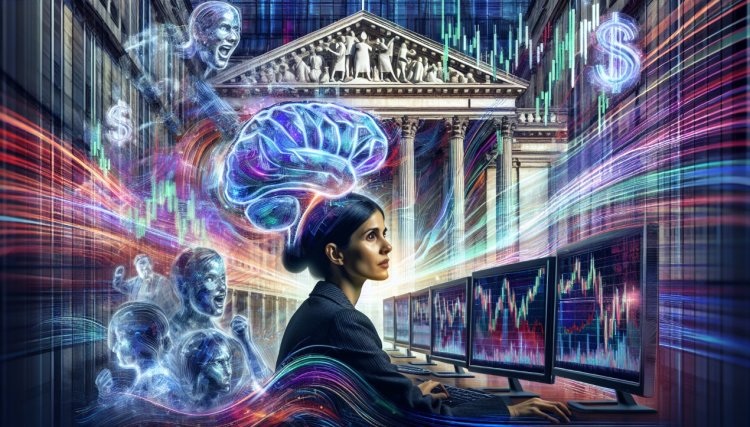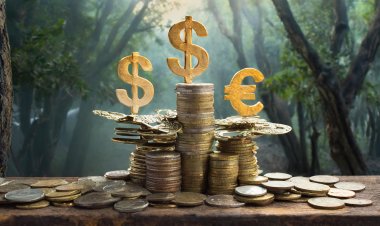Secrets of How to Become a Profitable Forex Trader: Emotions, Hormones, and Risk
Master your mind, master the market! Conquer the emotional rollercoaster of forex trading. Discover how hormones and psychology impact decisions, and unlock the secrets to controlling risk and achieving consistent profits.

Secrets of How to Become a Profitable Forex Trader: Emotions, Hormones, and Risk
Table of Contents
Introduction
There are a lot of feelings, hormones, and risks that come into play when you trade stocks. Traders are always under a lot of stress because they have to make quick decisions that could mean making or losing money. The psychology of trade shows how feelings like fear and greed can affect how choices are made. Neuroeconomic studies help us understand how hormones like testosterone can make people more or less likely to take risks. To understand the irrational actions that can cause financial problems, it is important to understand the human part of trading.
The London Stock Exchange
The London Stock Exchange is the world's first financial centre, after New York and Tokyo. It is in the middle of a business area called the city. The high-tech dealing rooms of the London Stock Exchange handle millions of trades every day.
The traders at the London Stock Exchange are always looking at portfolios and stocks, hoping to find a chance to buy low and sell high to make their customers' money grow. Even though it seems quiet, there is a lot of stress in the air because traders have to make quick choices that could mean profits or losses.
Traders at the London Stock Exchange must stay alert because the financial world never stops. Markets in New York and Asia keep going even after London closes. It's very competitive, and players have to quickly figure out how to make the right choices in a market that is very complicated.
The Rogue Traders
There is a group in the world of business called "rogue traders." Because they are feeling things like fear and greed, these sellers often make bad choices that can cause them to lose a lot of money. The desire to make quick money and the fear of missing out on chances can cloud their judgement, leading them to take too many risks.
Traders who did bad things include Jerome Kerviel of Societe Generale, Kweku Adoboli of UBS, and Bruno Iksil of JPMorgan, who is known as the "London Whale." Because these people were careless, they lost billions of dollars. Their stories got a lot of attention in the media and became warning tales in the financial world.
Inspired by the work of psychologist Daniel Kahneman, experimental economics studies have shed light on the psychological factors that make illegal traders act the way they do. These studies show how feelings, like the fear of losing something or the desire for a prize, can lead people to make bad decisions.
Daniel Kahneman and psychological factors
The study by psychologist Daniel Kahneman shows how psychological factors affect how traders make decisions. Emotions like fear and the need for rewards are very important in driving people to do dangerous things. When traders are greedy or afraid of losing, they may make bad choices that cost them a lot of money. To lower the risks of dealing, you need to understand how these psychological factors affect how you make decisions.
Kahneman's research shows that traders don't always make decisions in a clear and sensible way. Emotions, like fear and the need for a prize, can make it hard to think clearly and make people act without thinking. Traders can better control their feelings and make better choices in the fast-paced and competitive trading environment if they understand the psychological factors at play.
Kahneman's work led to the field of experimental economics, which tries to figure out how people affect how economies work. Researchers want to help buyers see risk more clearly and make better decisions by looking into the psychological aspects of decision-making. It's easier to see how traders' feelings and cognitive errors affect their decisions in the financial markets now that these studies have been done.
Experimental Economics and Human Behaviour
Experimental economics looks into the complicated link between how people act and how businesses make decisions. Researchers want to find out what makes traders do what they do by doing studies that are based on the work of famous scientists like Daniel Kahneman. These studies show how traders' feelings, like fear of losing money and the desire for fame, affect how they think about risk and make choices.
Researchers use experimental economics to look into how cognitive errors and emotional reactions affect how traders act in the financial markets. By learning about how people make decisions in the economy, experts hope to improve how buyers see risk and encourage them to make more sensible decisions. By looking at these studies, we can learn important lessons about how to effectively deal with the complicated trading world.
The Influence of Testosterone on Risk-Taking
Traders on the stock market floors are more likely to take risks when they are high on testosterone, the male sexual hormone. Researchers have found that higher amounts of testosterone can make people more impulsive and make them take more risks. The draw of possible gains often leads traders whose baseline testosterone levels are higher to make decisions that involve more risk.
A lot of young men in their prime years work as traders on the trading floors of London, Wall Street, and Tokyo. This means that testosterone levels are often at their highest. This natural effect can boost the production of dopamine, the brain chemical that makes us feel good, which can make us feel completely euphoric when we win a lot of money.
While testosterone can give dealers more confidence and drive, it can also make risk-taking habits more addictive. Traders can become addicted to the thrill of trading because winning trades give them a rush of dopamine. This makes them take more chances in order to get bigger wins. This state of mind, along with the stress of trading, can cloud judgement and cause people to make hasty decisions, which can threaten the safety of the economy.
The Role of the Brain in Trading Decisions
The brain is a very important part of trading because it helps traders make decisions and understand how the financial markets work. Neuroscientific research has shown that our brains handle feelings like fear and greed, which can change how risky we are when we trade. The brain's reward system releases dopamine, which can push traders to seek the thrilling feeling of success, which can lead them to take more risks in search of bigger benefits.
When people are under a lot of stress and have to make quick choices on the trade floor, their instincts often take precedence over their logical thinking. The brain is always weighing the risks and benefits of different options. This, along with traders' emotional responses and conscious thought, affects their choices. But in the fast-paced and competitive world of investing, feelings like fear of losing can take over and make people make hasty and irrational choices.
Brain regions, like the dorsal lateral prefrontal cortex, have been found by researchers to be very important for managing emotions and making smart decisions. In the fast-paced world of dealing, traders can better control their feelings and make better choices if they know how the brain processes information and responds to fear and stress.
The Influence of Stress and Fear on Decision-Making
Professional traders in the stock market are constantly under a lot of stress and fear, which can have a big effect on how they make decisions. Fear of losing and the desire to make money can cloud your judgement and make you act without thinking, which can change the results of trades. Neuroeconomic studies have shown that people are more aware of possible losses when they are under a lot of stress. This makes them more willing to take chances in order to avoid bad results.
Experiments have shown that when traders are in high-stress situations, their brains focus more on possible losses than wins. This changes how they think about risk and how they make decisions. Emotional factors, like fear and worry, have a big impact on how traders act in these situations, often ignoring their better judgement and causing them to take too many risks.
In the fast-paced and competitive world of trade, it's important to know how worry and fear affect decision-making. By understanding how these emotions affect behaviour, traders can come up with ways to better control their feelings, make smarter choices, and lower the risks that come with acting on impulse out of fear and stress.
Emotions and Trading Behaviour
When people sell on the stock market, their feelings have a big impact on the choices they make. Fear and greed are two of the strongest feelings that can change how people trade. Traders are always under the gun to make quick choices that could mean getting money or losing money. Emotional reactions can affect how people take risks and make decisions, which can lead traders to take too many risks.
Studies in the field of neuroeconomics have shown that hormones like testosterone can also have a big effect on how risky traders are. Having more testosterone has been linked to taking more risks and being irrationally excited. The draw of possible gains often leads traders whose baseline testosterone levels are higher to make decisions that involve more risk.
To lower risks and help people make smart decisions, it's important to understand how feelings and hormones affect trading habits. In the fast-paced and competitive world of dealing, traders need to learn how to control their feelings, understand how fear and greed affect their choices, and come up with plans to make smart decisions.
The Role of Dopamine and Addiction in Trading
Traders on the stock market floors are more likely to take risks when they are high on testosterone, the male sexual hormone. Researchers have found that higher amounts of testosterone can make people more impulsive and make them take more risks. The draw of possible gains often leads traders whose baseline testosterone levels are higher to make decisions that involve more risk.
A lot of young men in their prime years work as traders on the trading floors of London, Wall Street, and Tokyo. This means that testosterone levels are often at their highest. This natural effect can boost the production of dopamine, the brain chemical that makes us feel good, which can make us feel completely euphoric when we win a lot of money.
While testosterone can give dealers more confidence and drive, it can also make risk-taking habits more addictive. Traders can become addicted to the thrill of trading because winning trades give them a rush of dopamine. This makes them take more chances in order to get bigger wins. This state of mind, along with the stress of trading, can cloud judgement and cause people to make hasty decisions, which can threaten the safety of the economy.
The Influence of Hormones on Trader Behaviour
Traders on the stock market floors are more likely to take risks when they are high on testosterone, the male sexual hormone. Researchers have found that higher amounts of testosterone can make people more impulsive and make them take more risks. People who are traders and have higher testosterone levels tend to make decisions that are riskier, often because they want to make more money.
A lot of young men in their prime years work as traders on the trading floors of London, Wall Street, and Tokyo. This means that testosterone levels are often at their highest. This natural effect can boost the production of dopamine, the brain chemical that makes us feel good, which can make us feel completely euphoric when we win a lot of money.
While testosterone can give dealers more confidence and drive, it can also make risk-taking habits more addictive. Traders can become addicted to the thrill of trading because winning trades give them a rush of dopamine. This makes them take more chances in order to get bigger wins. This state of mind, along with the stress of trading, can cloud judgement and cause people to make hasty decisions, which can threaten the safety of the economy.
The Future of Trading: Neuro-Stimulation and Bionic Traders
New developments in neuro-stimulation and the idea of "bionic traders" are on the horizon in the trading world, which is always changing. Neurostimulation is becoming more popular as a way to change brain functions and improve decision-making. This is especially true in high-stress settings like trade rooms. Traders might be able to make better decisions and lessen the effects of feelings like fear and greed by changing the way neurons work in a controlled way.
Bionic traders with wires inserted in their heads might sound like something out of science fiction, but researchers are looking into how technology could be used to help people do better in trading. The idea of using brain stimulation to help people make better decisions is becoming more popular in both the military and the stock markets.
Looking ahead to the future of trading, neuro-stimulation could change the way traders work by helping people make better decisions, control their feelings, and improve their cognitive processes. By combining human knowledge with cutting-edge technology, the financial world may see a new age of trade in which advanced neural inputs add to the human factor.
Improving Trader Performance and Market Stability
Enhancing trader performance and ensuring market stability are crucial aspects of the financial industry. Traders need to manage their emotions effectively, recognise the impact of fear and greed on their decisions, and develop strategies to make informed choices in the fast-paced trading environment. By understanding the complex interplay of emotions and hormones in trading behaviour, traders can mitigate risks and promote rational decision-making.
Experimental economics studies have shed light on the psychological factors influencing traders' behaviours. The insights gained from these studies offer valuable lessons on navigating the complexities of the trading environment effectively. By delving into the psychological dimensions of decision-making, researchers aim to improve traders' risk perception and promote more rational choices.
Neuroeconomic research has highlighted the role of hormones like testosterone in driving risk-taking behaviours among traders. Rising levels of testosterone can lead to increased risk-taking and irrational exuberance. Traders with higher testosterone levels may take greater risks, driven by the allure of potential profits. Understanding how hormones influence decision-making is essential to managing the addictive nature of risk-taking behaviours.
FAQ
What are the main emotions that drive trading behaviour?
The main emotions that drive trading behaviour are fear and greed. Traders fear loss and are driven by the desire to make substantial profits. These emotions can significantly impact decision-making processes and often lead traders to take excessive risks.
How do stress and fear influence decision-making in trading?
Stress and fear can significantly influence decision-making in trading. When traders are under pressure or facing intense emotions, such as fear of loss, they are more likely to be sensitive to potential losses. This increased sensitivity leads to a greater willingness to take risks in order to avoid negative outcomes.
What role do hormones play in trader behaviour?
Hormones, such as testosterone, play a crucial role in influencing risk-taking behaviour among traders. Rising levels of testosterone can drive irrational exuberance and lead to increased risk-taking. Traders with higher baseline testosterone levels tend to take greater risks in their decision-making processes, often driven by the allure of potential profits.
How do emotions and hormones interact to affect trading decisions?
Emotions and hormones interact to affect trading decisions by influencing risk perception and decision-making processes. Emotions like fear and greed can drive traders to take excessive risks, while hormones like testosterone can intensify the addictive nature of risk-taking behaviours. Understanding this interplay is essential for traders to make informed decisions and mitigate risks.
What measures can be taken to improve trader performance and market stability?
To improve trader performance and market stability, traders need to manage their emotions effectively, recognise the impact of fear and greed on their decisions, and develop strategies to make informed choices in the fast-paced trading environment. Companies also need to review the culture of the trading floor and modify the allocation of bonuses to guide traders towards making rational decisions and avoiding significant losses.



 WaveTrendZ
WaveTrendZ 
























